- Home
- Packaging Products
- Film Type Self Adhesive Labels Market Size, Future Growth and Forecast 2033
Film Type Self Adhesive Labels Market Size, Future Growth and Forecast 2033
Film Type Self Adhesive Labels Market Segments - by Material (Polypropylene, Polyethylene, Polyvinyl Chloride, Others), Application (Food & Beverages, Pharmaceuticals, Personal Care, Industrial, Retail, Logistics, Others), Printing Technology (Flexography, Digital Printing, Offset, Gravure, Screen Printing), and End-User (Manufacturing, Retail, Logistics, Healthcare, Others) - Market Dynamics, Growth Opportunities, Strategic Drivers, and PESTLE Outlook (2025–2033)
Film Type Self Adhesive Labels Market Outlook
The Film Type Self Adhesive Labels market was valued at $25 billion in 2024 and is projected to reach $40 billion by 2033, growing at a CAGR of 5.5% during the forecast period 2025-2033. This market is experiencing significant growth due to the increasing demand for efficient and cost-effective labeling solutions across various industries. The versatility of film type self-adhesive labels, which offer durability, resistance to moisture, and the ability to adhere to a wide range of surfaces, makes them an attractive choice for manufacturers and retailers. The rise in e-commerce and logistics sectors has further fueled the demand for these labels, as they are essential for product identification and tracking. Additionally, advancements in printing technologies have enhanced the aesthetic appeal and functionality of these labels, contributing to their widespread adoption.
However, the market faces certain challenges that could hinder its growth. The fluctuating prices of raw materials, such as polypropylene and polyethylene, pose a significant restraint, impacting the overall production costs. Moreover, stringent environmental regulations regarding the disposal and recycling of plastic materials are compelling manufacturers to explore sustainable alternatives, which could affect the market dynamics. Despite these challenges, the market holds immense growth potential, driven by the increasing focus on product differentiation and branding. Companies are investing in research and development to create innovative labeling solutions that cater to the evolving consumer preferences and regulatory requirements.
Report Scope
| Attributes | Details |
| Report Title | Film Type Self Adhesive Labels Market Size, Future Growth and Forecast 2033 |
| Base Year | 2024 |
| Historic Data | 2017-2023 |
| Forecast Period | 2025-2033 |
| Number of Pages | 104 |
| Material | Polypropylene, Polyethylene, Polyvinyl Chloride, Others |
| Application | Food & Beverages, Pharmaceuticals, Personal Care, Industrial, Retail, Logistics, Others |
| Printing Technology | Flexography, Digital Printing, Offset, Gravure, Screen Printing |
| End-User | Manufacturing, Retail, Logistics, Healthcare, Others |
| Customization Available | Yes* |
Opportunities & Threats
The Film Type Self Adhesive Labels market presents numerous opportunities for growth, primarily driven by the expanding e-commerce and logistics sectors. As online shopping continues to surge, the demand for efficient labeling solutions for product identification and tracking is on the rise. This trend is particularly prominent in emerging economies, where the e-commerce industry is witnessing exponential growth. Additionally, the increasing focus on product differentiation and branding is encouraging manufacturers to invest in innovative labeling solutions that enhance the visual appeal and functionality of their products. The development of eco-friendly and sustainable labeling materials is another area of opportunity, as companies strive to meet the growing consumer demand for environmentally responsible products.
Technological advancements in printing technologies are also creating new avenues for growth in the Film Type Self Adhesive Labels market. The adoption of digital printing, in particular, is gaining traction due to its ability to offer high-quality, customizable labels with quick turnaround times. This technology enables manufacturers to produce short runs of labels with variable data, catering to the increasing demand for personalized and targeted marketing campaigns. Furthermore, the integration of smart labeling technologies, such as QR codes and RFID tags, is enhancing the functionality of Self-Adhesive Labels, providing consumers with additional information and improving supply chain efficiency.
Despite the promising opportunities, the Film Type Self Adhesive Labels market faces certain threats that could impact its growth trajectory. The volatility in raw material prices, particularly for petroleum-based products like polypropylene and polyethylene, poses a significant challenge for manufacturers. These fluctuations can lead to increased production costs, affecting the profitability of companies operating in this market. Additionally, the stringent environmental regulations regarding the use and disposal of plastic materials are compelling manufacturers to explore alternative, sustainable solutions. This shift towards eco-friendly materials may require significant investments in research and development, posing a financial burden on companies, especially small and medium-sized enterprises.
The competitive landscape of the Film Type Self Adhesive Labels market is characterized by the presence of several key players, each striving to enhance their market share through strategic initiatives. The market is moderately fragmented, with a mix of global and regional players competing for dominance. Companies are focusing on expanding their product portfolios, investing in research and development, and adopting advanced technologies to gain a competitive edge. The increasing demand for customized and innovative labeling solutions is driving companies to enhance their production capabilities and improve their service offerings.
Leading companies in the Film Type Self Adhesive Labels market include Avery Dennison Corporation, CCL Industries Inc., UPM-Kymmene Corporation, 3M Company, and Lintec Corporation. Avery Dennison Corporation holds a significant market share, owing to its extensive product portfolio and strong global presence. The company is known for its innovative labeling solutions and commitment to sustainability, which have helped it maintain a competitive position in the market. CCL Industries Inc. is another major player, renowned for its diverse range of labeling products and focus on technological advancements. The company's strategic acquisitions and partnerships have further strengthened its market position.
UPM-Kymmene Corporation is a key player in the Film Type Self Adhesive Labels market, known for its sustainable labeling solutions and emphasis on environmental responsibility. The company's strong focus on research and development has enabled it to introduce innovative products that cater to the evolving consumer preferences. 3M Company, with its extensive experience in the adhesive industry, offers a wide range of high-performance labeling solutions. The company's commitment to innovation and quality has helped it maintain a strong foothold in the market. Lintec Corporation, a leading Japanese manufacturer, is recognized for its advanced adhesive technologies and diverse product offerings, catering to various industries worldwide.
Other notable players in the market include Constantia Flexibles Group GmbH, Coveris Holdings S.A., Fuji Seal International, Inc., and Mondi Group. These companies are actively investing in research and development to introduce new and innovative labeling solutions that meet the changing consumer demands. The competitive landscape is further intensified by the presence of regional players, who are leveraging their local expertise and customer relationships to gain a competitive advantage. The market share distribution among these companies is influenced by factors such as pricing strategies, product innovation, and strategic partnerships, which play a crucial role in determining their competitive positioning.
Key Highlights Film Type Self Adhesive Labels Market

- The market is projected to grow at a CAGR of 5.5% from 2025 to 2033, reaching $40 billion by 2033.
- Increasing demand from the e-commerce and logistics sectors is driving market growth.
- Technological advancements in printing technologies, particularly digital printing, are enhancing market dynamics.
- Environmental regulations are pushing manufacturers towards sustainable labeling solutions.
- Key players are focusing on product innovation and strategic partnerships to strengthen their market position.
- The Asia-Pacific region is expected to witness the highest growth rate during the forecast period.
- Smart labeling technologies, such as QR codes and RFID tags, are gaining popularity.
- Fluctuating raw material prices pose a significant challenge for market players.
- Customization and personalization of labels are becoming increasingly important for branding and marketing.
- Regional players are leveraging local expertise to gain a competitive edge.
Competitive Intelligence
The competitive landscape of the Film Type Self Adhesive Labels market is shaped by the strategic initiatives and innovations of key players. Avery Dennison Corporation, a leader in the market, is known for its extensive product portfolio and commitment to sustainability. The company focuses on developing eco-friendly labeling solutions and has a strong global presence, which contributes to its significant market share. CCL Industries Inc. is another major player, renowned for its diverse range of labeling products and focus on technological advancements. The company's strategic acquisitions and partnerships have further strengthened its market position, allowing it to cater to a wide range of industries.
UPM-Kymmene Corporation is a key player in the market, recognized for its sustainable labeling solutions and emphasis on environmental responsibility. The company's strong focus on research and development has enabled it to introduce innovative products that cater to the evolving consumer preferences. 3M Company, with its extensive experience in the adhesive industry, offers a wide range of high-performance labeling solutions. The company's commitment to innovation and quality has helped it maintain a strong foothold in the market. Lintec Corporation, a leading Japanese manufacturer, is recognized for its advanced adhesive technologies and diverse product offerings, catering to various industries worldwide.
Other notable players in the market include Constantia Flexibles Group GmbH, Coveris Holdings S.A., Fuji Seal International, Inc., and Mondi Group. These companies are actively investing in research and development to introduce new and innovative labeling solutions that meet the changing consumer demands. The competitive landscape is further intensified by the presence of regional players, who are leveraging their local expertise and customer relationships to gain a competitive advantage. The market share distribution among these companies is influenced by factors such as pricing strategies, product innovation, and strategic partnerships, which play a crucial role in determining their competitive positioning.
In terms of geographic reach, companies are expanding their operations in emerging markets to capitalize on the growing demand for self-adhesive labels. The Asia-Pacific region, in particular, is witnessing significant investments from key players, driven by the rapid growth of the e-commerce and logistics sectors. The focus on innovation and sustainability is a common theme among market leaders, as they strive to differentiate themselves in a competitive landscape. The integration of smart labeling technologies, such as QR codes and RFID tags, is also gaining traction, providing companies with new opportunities to enhance their product offerings and improve supply chain efficiency.
Regional Market Intelligence of Film Type Self Adhesive Labels
The global Film Type Self Adhesive Labels market is witnessing significant growth across various regions, with each region exhibiting unique market dynamics. In North America, the market is driven by the increasing demand for efficient labeling solutions in the retail and logistics sectors. The presence of major players and the adoption of advanced printing technologies are contributing to the market's growth in this region. The market in Europe is characterized by the growing focus on sustainability and eco-friendly labeling solutions. Stringent environmental regulations are pushing manufacturers to develop innovative products that meet the evolving consumer preferences.
The Asia-Pacific region is expected to witness the highest growth rate during the forecast period, driven by the rapid expansion of the e-commerce and logistics sectors. The increasing demand for consumer goods and the growing focus on product differentiation are fueling the market's growth in this region. In Latin America, the market is driven by the rising demand for self-adhesive labels in the food and beverage industry. The region's growing middle-class population and increasing disposable income are contributing to the market's expansion. The Middle East & Africa region is witnessing steady growth, driven by the increasing demand for labeling solutions in the healthcare and industrial sectors.
Top Countries Insights in Film Type Self Adhesive Labels
In the United States, the Film Type Self Adhesive Labels market is valued at approximately $6 billion, with a CAGR of 4%. The market is driven by the increasing demand for efficient labeling solutions in the retail and logistics sectors. The presence of major players and the adoption of advanced printing technologies are contributing to the market's growth in this country. In China, the market is valued at around $5 billion, with a CAGR of 7%. The rapid expansion of the e-commerce and logistics sectors is fueling the market's growth, along with the increasing demand for consumer goods.
Germany's market is valued at approximately $3 billion, with a CAGR of 5%. The growing focus on sustainability and eco-friendly labeling solutions is driving the market's growth in this country. In India, the market is valued at around $2 billion, with a CAGR of 9%. The increasing demand for self-adhesive labels in the food and beverage industry, along with the growing middle-class population, is contributing to the market's expansion. Brazil's market is valued at approximately $1.5 billion, with a CAGR of 6%. The rising demand for labeling solutions in the healthcare and industrial sectors is driving the market's growth in this country.
Film Type Self Adhesive Labels Market Segments Insights

Material Analysis
The Film Type Self Adhesive Labels market is segmented by material into polypropylene, polyethylene, polyvinyl chloride, and others. Polypropylene is the most widely used material due to its excellent clarity, durability, and resistance to moisture and chemicals. It is favored in applications where high-quality printability and aesthetic appeal are essential. Polyethylene, known for its flexibility and toughness, is used in applications requiring labels to conform to irregular surfaces. Polyvinyl chloride offers excellent durability and is used in harsh environments where resistance to chemicals and weathering is crucial. The demand for sustainable materials is rising, prompting manufacturers to explore bio-based and recyclable options.
Polypropylene labels are gaining traction in the food and beverage industry due to their ability to withstand refrigeration and moisture. The material's versatility makes it suitable for various printing technologies, including digital and flexographic printing. Polyethylene labels are popular in the personal care and household products sectors, where flexibility and resistance to moisture are critical. The increasing focus on sustainability is driving the demand for eco-friendly materials, with companies investing in research and development to create biodegradable and recyclable labeling solutions. The shift towards sustainable materials is expected to influence the competitive landscape, with companies that offer innovative solutions gaining a competitive edge.
Application Analysis
The application segment of the Film Type Self Adhesive Labels market includes food and beverages, pharmaceuticals, personal care, industrial, retail, logistics, and others. The food and beverage industry is the largest application segment, driven by the need for efficient labeling solutions for product identification and branding. The increasing demand for packaged and processed foods is fueling the growth of this segment. In the pharmaceutical industry, self-adhesive labels are essential for ensuring product safety and compliance with regulatory requirements. The personal care sector is witnessing significant growth, driven by the increasing demand for aesthetically appealing and informative labels.
The logistics and retail sectors are experiencing rapid growth, driven by the expansion of e-commerce and the need for efficient supply chain management. Self-adhesive labels play a crucial role in product tracking and inventory management, contributing to the growth of these segments. The industrial sector is also witnessing increased demand for self-adhesive labels, driven by the need for durable and resistant labeling solutions in harsh environments. The growing focus on product differentiation and branding is encouraging manufacturers to invest in innovative labeling solutions that enhance the visual appeal and functionality of their products.
Printing Technology Analysis
The Film Type Self Adhesive Labels market is segmented by printing technology into flexography, digital printing, offset, gravure, and screen printing. Flexography is the most widely used printing technology, known for its versatility and cost-effectiveness in producing large volumes of labels. It is favored in applications where high-quality printability and fast turnaround times are essential. Digital printing is gaining traction due to its ability to offer high-quality, customizable labels with quick turnaround times. This technology enables manufacturers to produce short runs of labels with variable data, catering to the increasing demand for personalized and targeted marketing campaigns.
Offset printing is known for its high-quality printability and is used in applications where precision and detail are crucial. Gravure printing is favored for its ability to produce high-quality images and is used in applications where durability and resistance to wear are essential. Screen printing is used in applications where thick ink deposits and vibrant colors are required. The increasing adoption of digital printing is driving the demand for advanced printing technologies, with companies investing in research and development to enhance their capabilities and offer innovative solutions that meet the evolving consumer preferences.
End-User Analysis
The end-user segment of the Film Type Self Adhesive Labels market includes manufacturing, retail, logistics, healthcare, and others. The manufacturing sector is the largest end-user segment, driven by the need for efficient labeling solutions for product identification and branding. The increasing demand for consumer goods and the growing focus on product differentiation are fueling the growth of this segment. The retail sector is witnessing significant growth, driven by the expansion of e-commerce and the need for efficient supply chain management. Self-adhesive labels play a crucial role in product tracking and inventory management, contributing to the growth of this segment.
The logistics sector is experiencing rapid growth, driven by the increasing demand for efficient labeling solutions for product tracking and inventory management. The healthcare sector is witnessing increased demand for self-adhesive labels, driven by the need for ensuring product safety and compliance with regulatory requirements. The growing focus on product differentiation and branding is encouraging manufacturers to invest in innovative labeling solutions that enhance the visual appeal and functionality of their products. The increasing adoption of smart labeling technologies, such as QR codes and RFID tags, is enhancing the functionality of self-adhesive labels, providing consumers with additional information and improving supply chain efficiency.
Market Share Analysis
The Film Type Self Adhesive Labels market is characterized by a competitive landscape with several key players striving to enhance their market share through strategic initiatives. Avery Dennison Corporation holds a significant market share, owing to its extensive product portfolio and strong global presence. The company is known for its innovative labeling solutions and commitment to sustainability, which have helped it maintain a competitive position in the market. CCL Industries Inc. is another major player, renowned for its diverse range of labeling products and focus on technological advancements. The company's strategic acquisitions and partnerships have further strengthened its market position.
UPM-Kymmene Corporation is a key player in the Film Type Self Adhesive Labels market, known for its sustainable labeling solutions and emphasis on environmental responsibility. The company's strong focus on research and development has enabled it to introduce innovative products that cater to the evolving consumer preferences. 3M Company, with its extensive experience in the adhesive industry, offers a wide range of high-performance labeling solutions. The company's commitment to innovation and quality has helped it maintain a strong foothold in the market. Lintec Corporation, a leading Japanese manufacturer, is recognized for its advanced adhesive technologies and diverse product offerings, catering to various industries worldwide.
Other notable players in the market include Constantia Flexibles Group GmbH, Coveris Holdings S.A., Fuji Seal International, Inc., and Mondi Group. These companies are actively investing in research and development to introduce new and innovative labeling solutions that meet the changing consumer demands. The competitive landscape is further intensified by the presence of regional players, who are leveraging their local expertise and customer relationships to gain a competitive advantage. The market share distribution among these companies is influenced by factors such as pricing strategies, product innovation, and strategic partnerships, which play a crucial role in determining their competitive positioning.
Film Type Self Adhesive Labels Market Segments
The Film Type Self Adhesive Labels market has been segmented on the basis of
Material
- Polypropylene
- Polyethylene
- Polyvinyl Chloride
- Others
Application
- Food & Beverages
- Pharmaceuticals
- Personal Care
- Industrial
- Retail
- Logistics
- Others
Printing Technology
- Flexography
- Digital Printing
- Offset
- Gravure
- Screen Printing
End-User
- Manufacturing
- Retail
- Logistics
- Healthcare
- Others
Primary Interview Insights
What is driving the growth of the Film Type Self Adhesive Labels market?
What challenges does the market face?
Which region is expected to witness the highest growth?
How are companies addressing sustainability concerns?
What role does digital printing play in the market?
Latest Reports

The fiber drums market was valued at $1.2 billion in 2024 and is projected to reach $2.1 billion by 2033, growing at a CAGR of 6.5% during the forecast period 2025–2033.
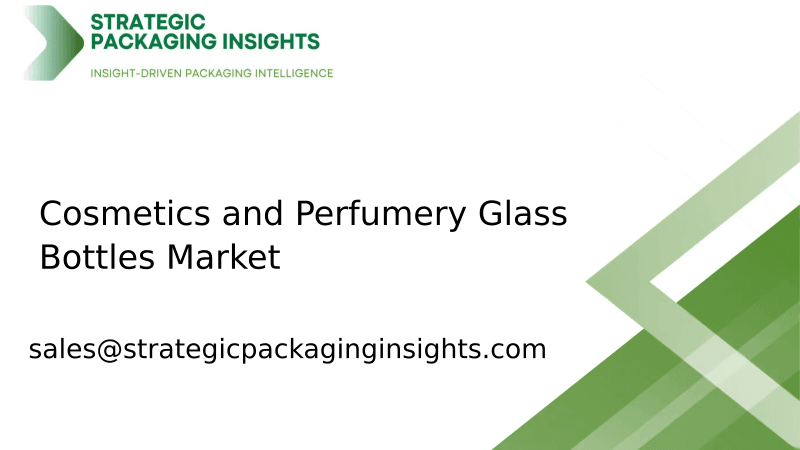
The cosmetics and perfumery glass bottles market was valued at $1.5 billion in 2024 and is projected to reach $2.3 billion by 2033, growing at a CAGR of 4.8% during the forecast period 2025–2033.

The medical devices packaging market was valued at $25 billion in 2024 and is projected to reach $40 billion by 2033, growing at a CAGR of 5.5% during the forecast period 2025–2033.
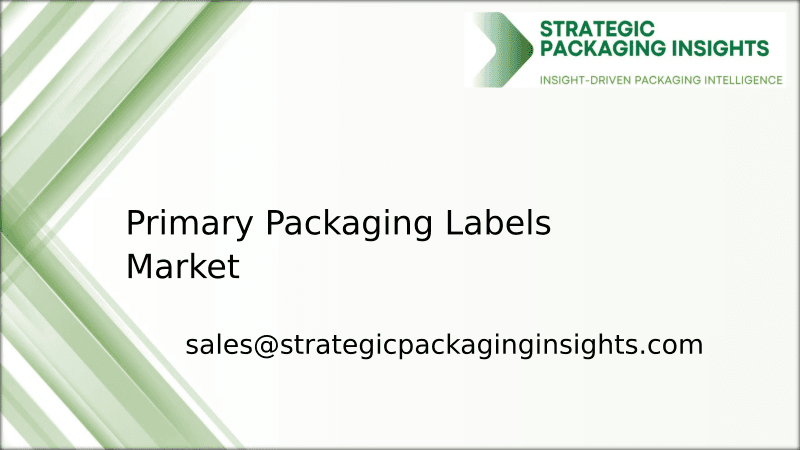
The primary packaging labels market was valued at $35 billion in 2024 and is projected to reach $55 billion by 2033, growing at a CAGR of 5.2% during the forecast period 2025–2033.

The corrugated board packaging market was valued at $250 billion in 2024 and is projected to reach $380 billion by 2033, growing at a CAGR of 4.5% during the forecast period 2025–2033.
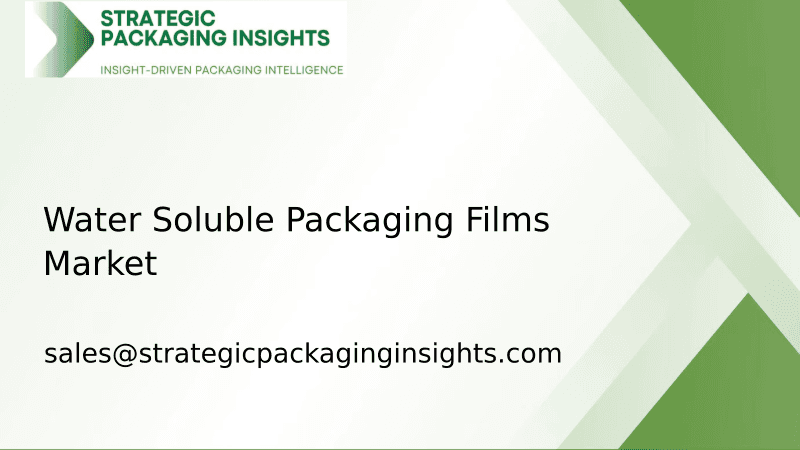
The Water Soluble Packaging Films market was valued at $2.8 billion in 2024 and is projected to reach $5.6 billion by 2033, growing at a CAGR of 8.1% during the forecast period 2025–2033.

The Aluminium Foil Packaging market was valued at $25 billion in 2024 and is projected to reach $40 billion by 2033, growing at a CAGR of 5.5% during the forecast period 2025–2033.

The self-heating food packaging market was valued at $4.5 billion in 2024 and is projected to reach $7.8 billion by 2033, growing at a CAGR of 6.2% during the forecast period 2025–2033.

The Smart Container market was valued at $2.5 billion in 2024 and is projected to reach $8.7 billion by 2033, growing at a CAGR of 14.5% during the forecast period 2025–2033.

The Automatic Labeling Machine market was valued at $2.5 billion in 2024 and is projected to reach $4.8 billion by 2033, growing at a CAGR of 7.2% during the forecast period 2025–2033.

The Hot Melt Glue Labeler market was valued at $1.2 billion in 2024 and is projected to reach $2.3 billion by 2033, growing at a CAGR of 6.5% during the forecast period 2025–2033.

The Ethical Label market was valued at $1.5 billion in 2024 and is projected to reach $3.2 billion by 2033, growing at a CAGR of 8.5% during the forecast period 2025–2033.

The Packaging Tensioner market was valued at $1.2 billion in 2024 and is projected to reach $2.3 billion by 2033, growing at a CAGR of 6.5% during the forecast period 2025–2033.
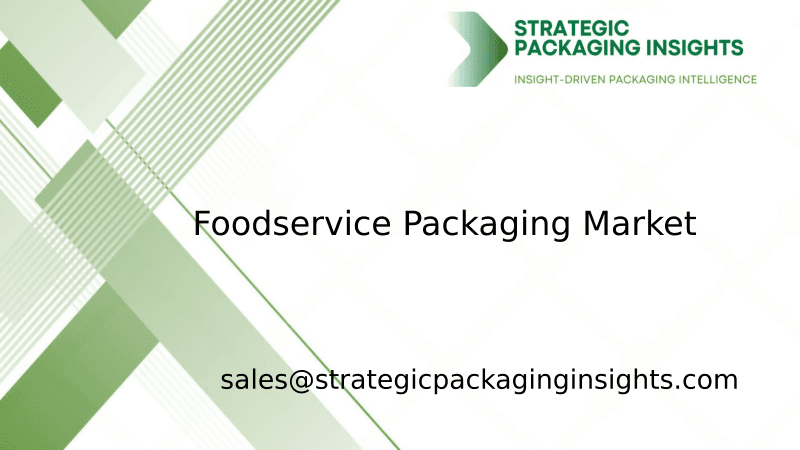
The foodservice packaging market was valued at $120 billion in 2024 and is projected to reach $180 billion by 2033, growing at a CAGR of 4.5% during the forecast period 2025–2033.

The nano-enabled packaging market was valued at $15.2 billion in 2024 and is projected to reach $35.6 billion by 2033, growing at a CAGR of 9.5% during the forecast period 2025–2033.
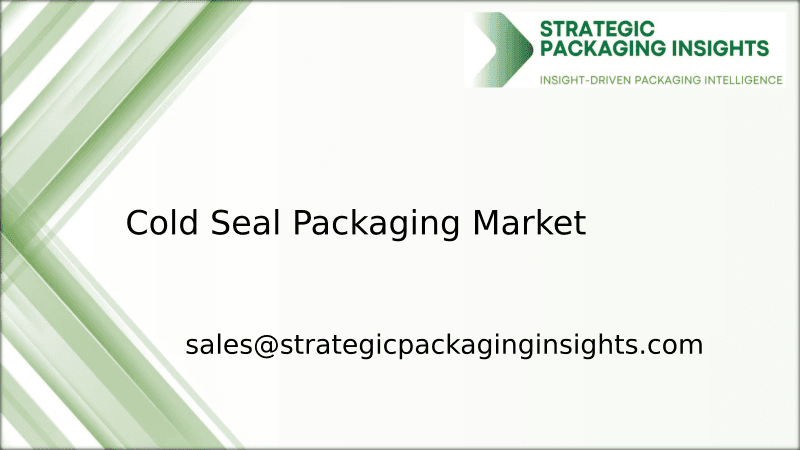
The Cold Seal Packaging market was valued at $1.5 billion in 2024 and is projected to reach $2.3 billion by 2033, growing at a CAGR of 4.8% during the forecast period 2025–2033.

The Transparent Barrier Packaging Films market was valued at $12.5 billion in 2024 and is projected to reach $20.3 billion by 2033, growing at a CAGR of 5.8% during the forecast period 2025–2033.

The Flatback Tape market was valued at $2.5 billion in 2024 and is projected to reach $4.1 billion by 2033, growing at a CAGR of 5.8% during the forecast period 2025–2033.
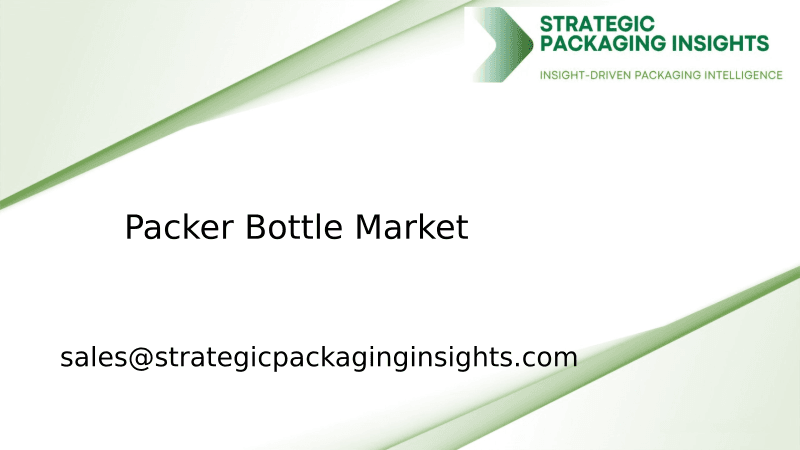
The packer bottle market was valued at $3.5 billion in 2024 and is projected to reach $5.8 billion by 2033, growing at a CAGR of 5.2% during the forecast period 2025–2033.
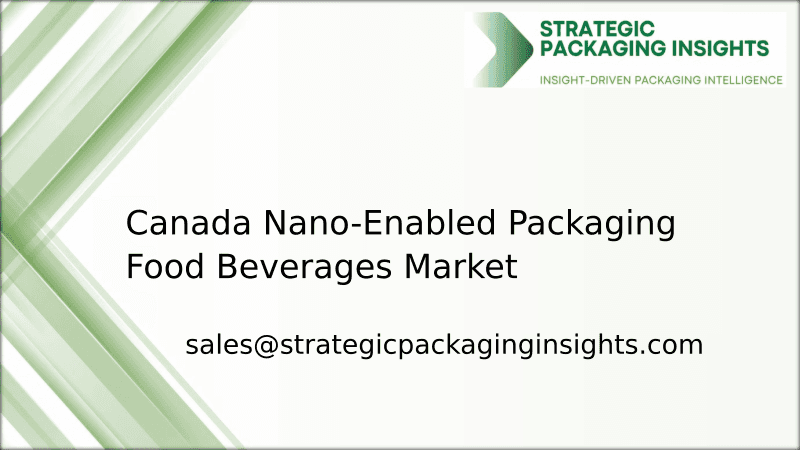
The Canada Nano-Enabled Packaging Food Beverages market was valued at $1.2 billion in 2024 and is projected to reach $3.5 billion by 2033, growing at a CAGR of 12.5% during the forecast period 2025–2033.
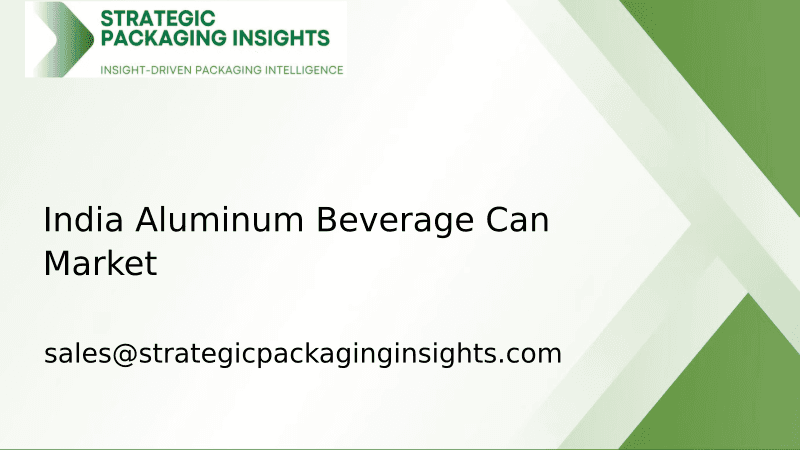
The India Aluminum Beverage Can market was valued at $1.2 billion in 2024 and is projected to reach $2.5 billion by 2033, growing at a CAGR of 8.5% during the forecast period 2025–2033.
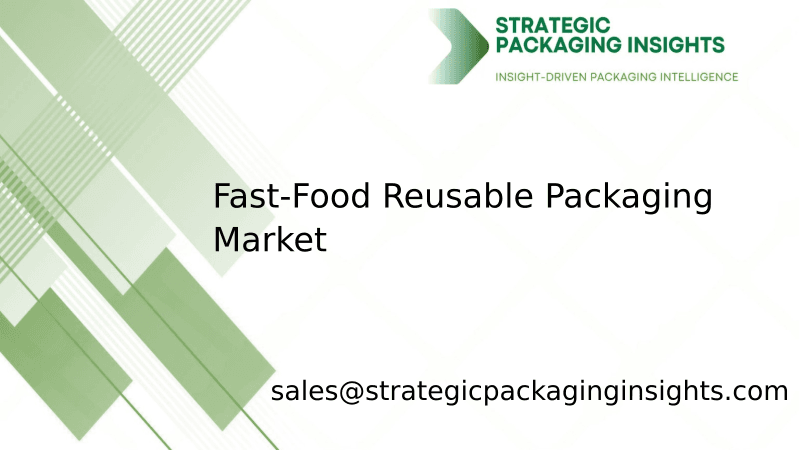
The fast-food reusable packaging market was valued at $1.2 billion in 2024 and is projected to reach $3.5 billion by 2033, growing at a CAGR of 12.5% during the forecast period 2025–2033.
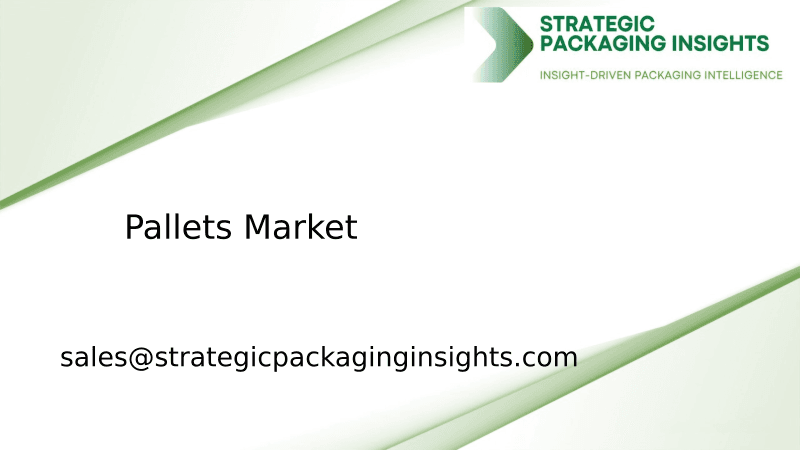
The pallets market was valued at $59.91 billion in 2024 and is projected to reach $88.69 billion by 2033, growing at a CAGR of 4.5% during the forecast period 2025–2033.

The lamination adhesives market was valued at $2.5 billion in 2024 and is projected to reach $4.1 billion by 2033, growing at a CAGR of 5.8% during the forecast period 2025–2033.

The garment packing machine market was valued at $1.2 billion in 2024 and is projected to reach $2.5 billion by 2033, growing at a CAGR of 8.5% during the forecast period 2025–2033.

The fiber drums market was valued at $1.2 billion in 2024 and is projected to reach $2.1 billion by 2033, growing at a CAGR of 6.5% during the forecast period 2025–2033.

The cosmetics and perfumery glass bottles market was valued at $1.5 billion in 2024 and is projected to reach $2.3 billion by 2033, growing at a CAGR of 4.8% during the forecast period 2025–2033.

The medical devices packaging market was valued at $25 billion in 2024 and is projected to reach $40 billion by 2033, growing at a CAGR of 5.5% during the forecast period 2025–2033.

The primary packaging labels market was valued at $35 billion in 2024 and is projected to reach $55 billion by 2033, growing at a CAGR of 5.2% during the forecast period 2025–2033.

The corrugated board packaging market was valued at $250 billion in 2024 and is projected to reach $380 billion by 2033, growing at a CAGR of 4.5% during the forecast period 2025–2033.

The Water Soluble Packaging Films market was valued at $2.8 billion in 2024 and is projected to reach $5.6 billion by 2033, growing at a CAGR of 8.1% during the forecast period 2025–2033.

The Aluminium Foil Packaging market was valued at $25 billion in 2024 and is projected to reach $40 billion by 2033, growing at a CAGR of 5.5% during the forecast period 2025–2033.

The self-heating food packaging market was valued at $4.5 billion in 2024 and is projected to reach $7.8 billion by 2033, growing at a CAGR of 6.2% during the forecast period 2025–2033.

The Smart Container market was valued at $2.5 billion in 2024 and is projected to reach $8.7 billion by 2033, growing at a CAGR of 14.5% during the forecast period 2025–2033.

The Automatic Labeling Machine market was valued at $2.5 billion in 2024 and is projected to reach $4.8 billion by 2033, growing at a CAGR of 7.2% during the forecast period 2025–2033.

The Hot Melt Glue Labeler market was valued at $1.2 billion in 2024 and is projected to reach $2.3 billion by 2033, growing at a CAGR of 6.5% during the forecast period 2025–2033.

The Ethical Label market was valued at $1.5 billion in 2024 and is projected to reach $3.2 billion by 2033, growing at a CAGR of 8.5% during the forecast period 2025–2033.

The Packaging Tensioner market was valued at $1.2 billion in 2024 and is projected to reach $2.3 billion by 2033, growing at a CAGR of 6.5% during the forecast period 2025–2033.

The foodservice packaging market was valued at $120 billion in 2024 and is projected to reach $180 billion by 2033, growing at a CAGR of 4.5% during the forecast period 2025–2033.

The nano-enabled packaging market was valued at $15.2 billion in 2024 and is projected to reach $35.6 billion by 2033, growing at a CAGR of 9.5% during the forecast period 2025–2033.

The Cold Seal Packaging market was valued at $1.5 billion in 2024 and is projected to reach $2.3 billion by 2033, growing at a CAGR of 4.8% during the forecast period 2025–2033.

The Transparent Barrier Packaging Films market was valued at $12.5 billion in 2024 and is projected to reach $20.3 billion by 2033, growing at a CAGR of 5.8% during the forecast period 2025–2033.

The Flatback Tape market was valued at $2.5 billion in 2024 and is projected to reach $4.1 billion by 2033, growing at a CAGR of 5.8% during the forecast period 2025–2033.

The packer bottle market was valued at $3.5 billion in 2024 and is projected to reach $5.8 billion by 2033, growing at a CAGR of 5.2% during the forecast period 2025–2033.

The Canada Nano-Enabled Packaging Food Beverages market was valued at $1.2 billion in 2024 and is projected to reach $3.5 billion by 2033, growing at a CAGR of 12.5% during the forecast period 2025–2033.

The India Aluminum Beverage Can market was valued at $1.2 billion in 2024 and is projected to reach $2.5 billion by 2033, growing at a CAGR of 8.5% during the forecast period 2025–2033.

The fast-food reusable packaging market was valued at $1.2 billion in 2024 and is projected to reach $3.5 billion by 2033, growing at a CAGR of 12.5% during the forecast period 2025–2033.

The pallets market was valued at $59.91 billion in 2024 and is projected to reach $88.69 billion by 2033, growing at a CAGR of 4.5% during the forecast period 2025–2033.

The lamination adhesives market was valued at $2.5 billion in 2024 and is projected to reach $4.1 billion by 2033, growing at a CAGR of 5.8% during the forecast period 2025–2033.

The garment packing machine market was valued at $1.2 billion in 2024 and is projected to reach $2.5 billion by 2033, growing at a CAGR of 8.5% during the forecast period 2025–2033.
